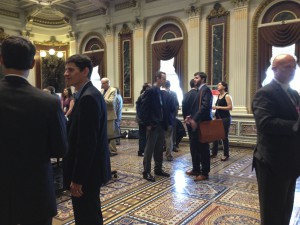In 1998, Open Science seemed like a pretty obvious projection of basic scientific principles into the digital age. I didn’t think the ideas would meet much, if any, resistance from the scientific community. And in October 1999, Brookhaven National Lab sponsored a meeting called Open Source / Open Science that, in retrospect, was a pretty utopian gathering. There were a lot of the current OpenScience community members present at the meeting (notably Brian Glanz and Greg Wilson). It felt like everyone would be convinced to do Open Source & Open Data science in short order.
The past 14 years have been instructive in just how long it can take to make cultural changes in the scientific community.
So, it was an amazing experience to be present when the Office of Science and Technology Policy (OSTP) announced the Champions of Change for Open Science. These are 13 incredible individuals and organizations with great stories about sharing their science. It feels like we’ve made significant motion on implementing policies that are friendly to Open Science. I should note that we’re particularly happy to see OSTP use the phrase Open Science, and not the more narrow terms: Open Data or Open Access. I’m hopeful that Open Source will also be part of science policy going forward.
 There was a second group who got the opportunity to present at this event at a poster session later that day. I haven’t seen the list publicized elsewhere, but these are some sharp folks who deserve recognition for their work. I’m going to highlight some of these in the coming week. Here’s the list of posters:
There was a second group who got the opportunity to present at this event at a poster session later that day. I haven’t seen the list publicized elsewhere, but these are some sharp folks who deserve recognition for their work. I’m going to highlight some of these in the coming week. Here’s the list of posters:
- Richard Judson & Ann Richard from the National Center for Computational Toxicology presented on “ACToR & DSSTox: EPA Open Information Tools for Chemicals in the Environment”
- Tom Bleier, Clark Dunson & Michael Lencioni from the QuakeFinder project presented on “Electromagnetic Earthquake Forecasting Research”
- David C. Van Essen from WUSTL presented on the “Human Connectome Project“
- Heather Piwowar & Jason Priem presented a poster on “ImpactStory: Open Carrots for Open Science”
- Jean-Claude Bradley (Drexel) and Andrew Lang (Oral Roberts University) presented a poster on “Open Notebook Science“.
- Dan Gezelter (that’s me) presented on “The OpenScience Project“.
- John Wilbanks from Sage Bionetworks presented on “Portable Legal Consent – Let Patients Donate Data to Science“
- Matt Martin from the National Center for Computational Toxicology presented on “ToxRefDB & ToxCastDB: High-Throughput Toxicology Resources”
- Brian Athey and Christoph Brockel presented on “The tranSMART Platform: Accelerating Open Science, Data Analytics and Data Sharing”
- Alexander Wait Zaranek, Ward Vandewege & Jonathan Sheffi from Clinical Future, Inc. presented on “Transparent Informatics: A Foundation for Precision Medicine“
It was an intense day, and I’m delighted that Open Science has finally come of age.

Hi Dan,
Thanks for the article on the Champions of Change Event/Open Science Poster session. Just one correction, could you please change the link for the Human Connectome Project to http://humanconnectome.org/. The site you linked to is to another project of the same name at MGH/UCLA, not the WUSTL/UMinn based project that David Van Essen presented on at the poster session. Unfortunately, the other project bought the more obvious URL before funding was awarded which has created some confusion.
Best,
Jennifer Elam
Outreach Coordinator, Human Connectome Project
Jennifer,
The link should be fixed now. Sorry about that!
–Dan